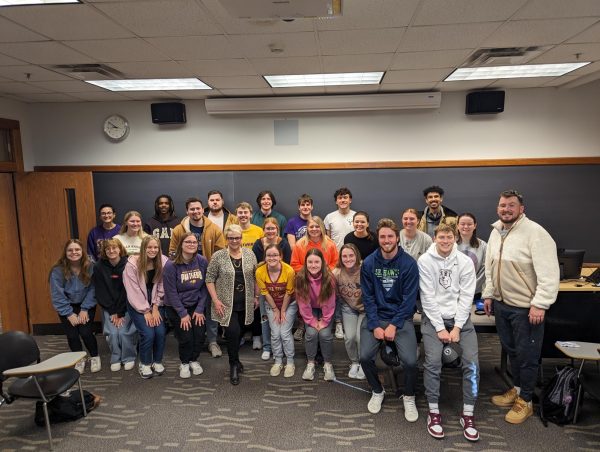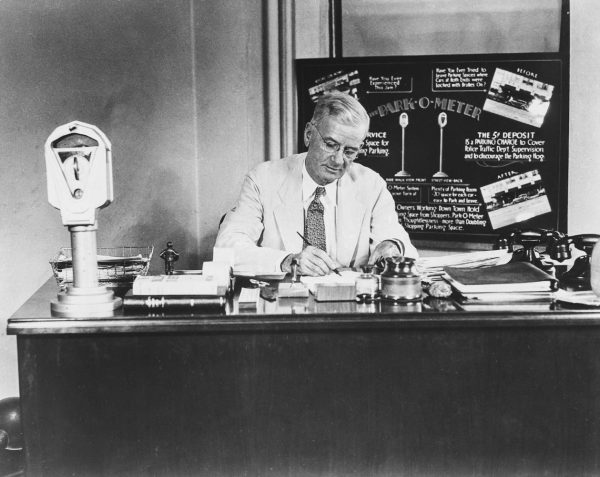He visits every year, but just who is Brother Jed?
Oct 15, 2015
A crowd of yelling students can mean many things on a college campus, but one of the most contentious causes of these are campus evangelists. Campus evangelists like Brother Jed Smock, who hails from Terre Haute, IN, return to campuses across the country every semester, inciting fervor and passion in the students, almost exclusively in opposition to their efforts.
Brother Matthias, UNI’s most recent evangelical visitor, may not be associated directly with Brother Jed, but the confrontational style of preaching exhibited by Matthias is indicative of Brother Jed’s “school” of ministry. Smock claims confrontational evangelism as the only way to impact students.
Smock’s visits to UNI’s campus are fequent and have been occurring for years. According to the Northern Iowan archives, he visited last year in 2014.
According to his website, brojed.org, Smock cites the Bible as his reason for doing this, saying that, “Proverbs 27:5 – Open rebuke is better than secret love” is the only way to reach students. This approach to spreading what he believes to be the ultimate truth comes from a mixture of views, attitudes and ideas.
According to his website, part of Smock’s mission is “to declare the gospel of Jesus Christ to the college and university students of America and the world.” Smock goes on to say: “the skeptics on the campuses are constantly condemning God and justifying their unbelief.”
Tanner Schrad, freshman biology major, believes that Smock’s form of evangelism is void of respect.
“[Smock] has his right to preach,” Schrad said, “[but] why can’t you have open love instead of open rebuke? […] You respect my decisions, and I’ll respect yours.”
Smock and other evangelists who frequent UNI’s campus have an approach that is considered by some as inflammatory and abrasive. This tactic causes many students to congregate in a unified opposition.
Some students, such as freshman English major Brady Tegeler, just ask for respect.
“If [the evangelists] all could be considerate of others…then go and spread your word,” Tegeler said, “but don’t get offended if someone says no.”
Some question why evangelists like Brother Jed choose college campuses as their pulpit. Smock has responded via his website to a student who questioned this very point, saying, “No, [you’re not the only sinners], but tomorrow you may be the influential sinners unless I can persuade you to become influential saints.”
UNI professor of mathematics, Doug Shaw, has had a lot of experience with Brother Jed specifically, and has had multiple interactions with the preacher for over 30 years.
According to Shaw, he was an undergraduate when he first encountered Smock at the University of Illinois in 1982. Since becoming a professor, Shaw has encountered Smock time and time again.
“To me, [Smock] is part of what it is to be on a campus,” Shaw said.
Shaw, while not necessarily agreeing with Smock’s ideas, was adamant about his capability as a speaker, debater and even as a performer. According to Shaw, Smock is one of best speakers he has seen.
“If you’re going to sell religion to people, this is the place to do it,” said Shaw. He claims that the people on the borders of the crowds that evangelists like Smock attract are the people who have not made up their mind about their personal beliefs. According to Shaw, those are the people that Smock and his fellow preachers want to target.
However, while Shaw credited Smock as a good public speaker, he also acknowledged that Smock “turns people off to Christianity too.”
Despite the amount of verbal backlash from students against these preaching methods, Smock continues his quest to “save” college students. Schrad said that many evangelists are “kind of like politicians.”
According to Schrad, these campus evangelists believe they are absolutely right, and all of them are vying for the minds of students, and reiterated that this race shouldn’t command such pointed anger. Schrad went on to say that every student has the right to explore themselves and their ideas without feeling condemned for expressing that right, and Smock’s approach to evangelism threatens that right.

















Henry Westin • Oct 16, 2015 at 5:12 pm
Jed’s “ministry” (hobby) doesn’t really change lives. That is naïve.
Jed Smock has lived sumptuously for 40 years by raking in tax-exempt “donations” from suckers. Smock enjoys a mansion, nice car, fine furniture, silverware, 3 piece suits, heated swimming pool, gourmet dining, constant travel, Caribbean cruises.
Smock has a gigantic ego. He only worked for a paycheck a year or so in his entire life. Too proud to take the discipline of working.
If you want a Christian role model, don’t look to Smock. He has mocked Blacks, even placing a “negro jockey” on his manicured lawn. He hails Columbus while justifying mistreatment and killing of Indians. Smock calls Indian women Squaws then laughs like a schoolboy.
I am a Black man. Smock speaks lovingly of plantation owners and even justifies slavery and segregation.
The kicker: Smock has yelled WHORE at coeds for 40 years, yet his own daughter got knocked up and bore a bastard.
Henry Westin • Oct 16, 2015 at 5:05 pm
Jed Smock is self-centered. When each of his 5 daughters had a birthday, he posted a FB “greeting” describing what HE WANTED from them to fulfill HIS agenda.
Hoped they’d all marry soon and be subjugated to a man who’d rule them. Never a word about wishing the girl good health, happiness, independence, career joys, or a rich life defined by her terms, not his.
Warning: of all the dangers surrounding these preachers/cult leaders, I believe the worst is this: Some, like Smock, play doctor.
Smock is quick to order anyone suffering from mental problems such as PTSD, depression, anxiety, domestic violence and rape victims, to stop their meds. Stop consulting doctors. Their only “cure” is to listen to him.
Smock is particularly toxic towards young women, especially those with no self confidence. He sharply scolded one coed for not forgiving the father who’d beaten and molested her. Rubbed her nose in her “evil” and “selfish” nature. Ordered her to stop anti-depressants. Smock added insult to injury and relished every minute of her torture. (If that girl had been under 18, I’d have Smock arrested for abusing a Minor).